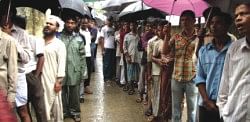Letters
A Tragic Loss
A meritorious student of DUET passed away this year. He was studying Civil Engineering and held the first place in his class. This boy had been suffering from hernia for the past few years, but it did not prevent him from living his life in a normal pace. His doctors had advised him to have this removed with a routine procedure. The boy decided to have the operation done during his winter vacation after his final exams were over. Unfortunately, the doctors at the Feni Sodor Hospital where he chose to have this done, did not have enough knowledge about this illness to perform the procedure. They also did not have the tools available to carry on the procedure. The boy died on the operating table. His parents lost their only son and our country lost a brilliant student with a bright future. This is not the first time something like this has happened because of untrained medical staff and unavailable resources. When is it going to stop?
Md Rashedul Haider Rashel
CSE, DUET
The Power of Human Resources
 |
Photo: star file |
What is the destiny of man? This beautiful country, Bangladesh consists of more than 160 million people, and has an ever-increasing population. We think an increasing population means increasing problems. Why don't we look at this in a more positive light? Why don't we think of it as a blessing like they do in China? We are surrounded by a lot of problems. But how are those problems created? Where have these problems originated from? What is the ultimate result and ultimate impact of these problems? We only think about what is happening as a result of these problems. In 1971, when the liberation war broke out, we all got united as one and won. We have to depend on foreign aid and day-by-day we are becoming lazy. But things do not have to be this way. We can use our most important resource, manpower, to get ahead. We have to set aside our differences and unite like we did in '71, only then will we be a real independent country.
Md Arman Chy Nayan
University of Dhaka
Stock Market Crash
The recent dramatic decline of stock prices resulting from the watchdogs' failure has brought the general small investors on the road.
The stock market crash has shattered the investors' confidence on what the market was based on. Crashes have been driven by the liquidity crisis and sudden strict rules placed on the commercial market participants by Bangladesh Bank (although the bank is right to curb the price of essentials).
These have been geared up by the latest silent role of the market regulators for the last consecutive crashing days. For the last year, the BO account holders have nearly trippled. They have been pumping up the market bubbles but our market watchdogs have not been able to add the minimum requisite bubbles. The recent stock market crisis has been naturally expected and many investors have started to raise questions on the SEC's role in the case of IPOs' pricing under the book building method. Many unruly investors take the stock market to be a speculative game field. Today, thousands of investors have lost their capital simply because they have thrown away their borrowed funds by only looking at the price trends. They have never gone for a fundamental analysis of stocks. If the investors are aware and the watchdogs are able to direct the market in the right way, the investors will restore their confidence and the stock market will be saved. The present government has lessons to learn from the stock market crisis in1996. How could they forget that?
Md Anowar Hossain ( Sabuz)
University of Chittagong
On Wikileaks
 This is in response to "Freedom of Speech", Letter to the Editor (Page 4), The Star, January 7, 2011 Why the Wikileaks extravaganza? Because democracy doesn't work, pure and simple. I fail to understand how a political system of governance that leaves the intricate and complex operations of the state to the whims of 'Joe 6-Pack' was ever allowed by the ruling class to dominate all other systems, but its mass appeal was too strong, and understandably so. The American leaders, or at least, the few capable ones among them, understand that they cannot trust democracy to help them lead their vast, powerful and complex nation. Unfortunately, they are also blessed with a population that talks of 'freedom' and 'democracy' like they are some divine truths, and are persuaded to change their entire government on nothing but HOPE and CHANGE. Thus, they either elect popular yet incompetent officials, or a tiny fraction of them turn out to be capable leaders. These leaders, who are few and far between, realise that they will often have to take decisions and approve of things which, although in the interest of the American people, will go against their liberal values. However, for a strong and powerful nation with plenty of enemies, these things need to be done, and most democratically elected 'leaders' will not have the nerve to do them. So they do it in incredible secrecy, and get worked up when some people try to disclose them and jeopardize their operations. In fact, the more democratically minded the American people get, the greater the necessity to keep secrets. The first and most fundamental function of government is the protection of its citizens, and if that requires the illusion of freedom, then so be it.
This is in response to "Freedom of Speech", Letter to the Editor (Page 4), The Star, January 7, 2011 Why the Wikileaks extravaganza? Because democracy doesn't work, pure and simple. I fail to understand how a political system of governance that leaves the intricate and complex operations of the state to the whims of 'Joe 6-Pack' was ever allowed by the ruling class to dominate all other systems, but its mass appeal was too strong, and understandably so. The American leaders, or at least, the few capable ones among them, understand that they cannot trust democracy to help them lead their vast, powerful and complex nation. Unfortunately, they are also blessed with a population that talks of 'freedom' and 'democracy' like they are some divine truths, and are persuaded to change their entire government on nothing but HOPE and CHANGE. Thus, they either elect popular yet incompetent officials, or a tiny fraction of them turn out to be capable leaders. These leaders, who are few and far between, realise that they will often have to take decisions and approve of things which, although in the interest of the American people, will go against their liberal values. However, for a strong and powerful nation with plenty of enemies, these things need to be done, and most democratically elected 'leaders' will not have the nerve to do them. So they do it in incredible secrecy, and get worked up when some people try to disclose them and jeopardize their operations. In fact, the more democratically minded the American people get, the greater the necessity to keep secrets. The first and most fundamental function of government is the protection of its citizens, and if that requires the illusion of freedom, then so be it.
Shehzad M Arifeen
Banani DOHS
Dhaka
Submission Guideline:
Letters to the Editor, Star Diary and Write to Mita, with the writer's name and address, should be within 200 words. All articles should be within 1,200 words. A cover letter is not necessary, but every write-up should include the writer's name, phone number and email address (if any). While The Star welcomes unsolicited articles and photographs, it cannot accept the responsibility of their loss or damage. The Star does not return unsolicited articles and photos. Response time for unsolicited write-ups ranges from three weeks to two months. All articles submitted are subject to editing for reasons of space and clarity.
All materials should be sent to: The Star magazine, 64-65, Kazi Nazrul Islam Avenue, Dhaka-1215, Fax: 880-2-8125155 or emailed to: <[email protected]>
It is recommended that those submitting work for the first time to The Star take a look at a sample copy beforehand. Our website is: http://www.thedailystar.net/magazine
Copyright (R) thedailystar.net 2010
